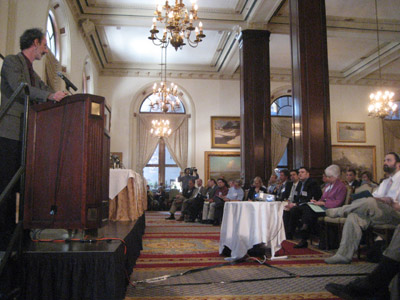As Illinois moves toward a state water supply plan, MPC co-hosted a May 16 conference to generate news ideas for protecting and sustaining our water resources.
Nearly 200
people gathered in
Chicago on May 16 at “Beyond Showerheads and
Sprinklers,” a conference to help chart a new, more sustainable course for water
supply management in
Illinois
. Throughout the day, conference-goers
grappled with a dilemma familiar to states across the country, but perplexing to
a state that borders the Great Lakes: demand for water is growing in
Illinois
, but supply is
not. Keynote speaker Peter Gleick challenged the audience to take a new approach
to protecting and preserving
Illinois
’ water
resources.

“Rethink
supply. Rethink demand. Improve water quality by protecting the natural
environment. Improve water management and governance,” said Gleick, president of
the Pacific Institute for Studies in
Development, Environment and Security
, and an internationally
recognized water expert. Gleick also identified significant pressures on global
water supplies – particularly climate change, population growth, increasing
quality of life, and biofuel production – and stressed that by developing
effective governance Illinois and the
Great Lakes region could become an
international model for the 21st century.
The goal of
“Beyond Showerheads and Sprinklers” was to outline the criteria of an effective
water supply planning system, and to create a set of recommendations to help the
Ill. Dept. of Natural Resources (IDNR) and
two regional pilot planning groups (Northeastern
Illinois Regional Water Supply Planning Group and the East Central Illinois Water Supply Planning
Committee
) define the proper roles and responsibilities of different
levels of government in managing water supply. To that end, the conference hosts – MPC, Openlands, and the Paul Simon Institute for Public Policy
– commissioned a white
paper to explore the demands of water supply planning and suggest a path toward
a state plan. Jack Wittman of
Wittman Hydro Planning Associates, Inc., drafted the paper, which is available for public review
and sparked a lively discussion that concluded the
conference.
Further speakers
included:
- Gary Clark, director of the
Office of Water Resources at IDNR, and the chairs of the two pilot planning
groups, Bonnie Thomson Carter and Brent O’Neill, who updated attendees on the
current state of water supply planning in Illinois. All three were
encouraged by the level of participation at the conference and largely
supported the white
paper;
- Sam Speck, commissioner on the
International Joint Commission that oversees the Great Lakes, who
discussed the benefits and ramifications for Illinois of the Great Lakes
Compact.
- Mary Ann Dickinson, executive
director of the Alliance for Water
Efficiency , who discussed
the ways in which current regulations in many states prohibit the use of grey
water (nonpotable water that has been run through a shower or washing
machine). Greywater is suitable
for lawn watering or use in toilets, and greatly reduces waste, but is mostly
lost down the drain;
- Otto Doering, professor of
agricultural economics at Purdue University, who spoke of the
complexities of the biofuel industry and its relation to water use and water
supply; and
CDM, Illinois American Water, Sloan
Valve, and Christopher B. Burke Engineering, Ltd. sponsored the conference. The Joyce Foundation and Lumpkin Family
Foundation generously funded the event.
The conference white paper, speaker
presentations, and more, are available on the conference’s online discussion
forum, Glass Half Full.
For more information on MPC's
efforts on state and regional water planning, please contact Josh Ellis at
(312) 863-6045, or jellis@metroplanning.org.